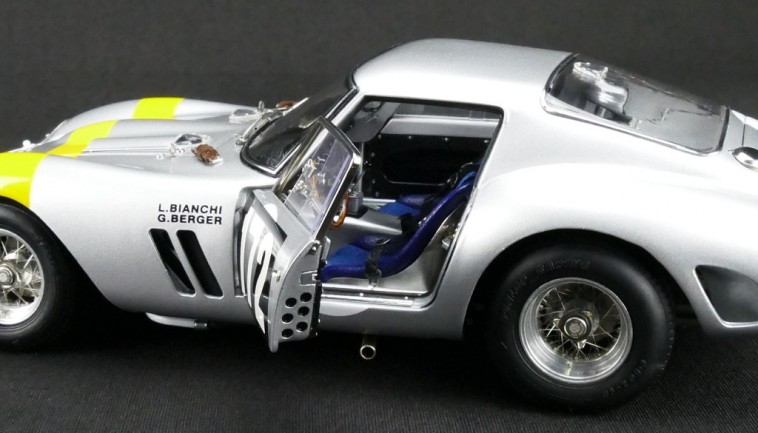No products
Product successfully added to your shopping cart
There are 0 items in your cart. There is 1 item in your cart.
CMC Ferrari 250 GTO, Tour de France 1964 172
-M-157-CMC
New product
Product Description Tour de France Automobile was launched in 1899 and held almost annually till 1986. Its first post-WWII race in 1951 marked the beginning of a “golden era” t
Product Description
Tour de France Automobile was launched in 1899 and held almost annually till 1986. Its first post-WWII race in 1951 marked the beginning of a “golden era” that would come to a conclusion in 1966. In the course of time, Ferrari provided a benchmark with its sophisticated GT cars. Between 1951 and 1962, the Scuderia won eight times in the overall standing.
Tour de France Automobile 1964 took place from September 11 through 20 in France and Italy.
Manning a Ferrari GTO (chassis #4153), the Belgian driver pair Lucien Bianchi/Georges Berger joined with other 116 competitors to start off in the city of Lille.
During the next nine days, competition unfolded in six stages, covering a total distance of 6,060 kilometers that ended in Nice. Only 36 teams made it to the finish in southern France. As always, participants had to complete a protracted drive through France that was timed by stages, but this time a visit to Monza, Italy was included. Altogether the long drive consisted of circuit races on the racetracks of Reims, Rouen, Le Mans and Monza in addition to mountain races at famous Col du Tourmalet, Mont Ventoux and Col de Turini. The first appearance of an American racing team had caused some sensation. It was none other than Carroll Shelby himself who signed up three Shelby Daytona’s for the starting grid. At first, these 380hp coupés dominated the race, but they all retired in the third stage because of some serious accidents. Eventually, a 250 GTO took over the lead like so many times before: Piloting their GTO with starting number 172, Lucien Bianchi and Georges Berger became the overall winner in the GT class. Once more the GTO turned out to be the standard-bearer.CMC Legal Disclaimer
The use of racing team and/or driver names, symbols, starting numbers, and/or descriptions is solely for reference purposes. Unless otherwise stated, it does not imply that the CMC scale model is a product of any of these racing teams/drivers or endorsed by any of them.
Model Description
Hand-crafted metal precision model with a left-hand drive, built from 1,863 single parts, of which 1,223 are made of metalAuthentic recreation of the Tour de France Automobile looksFunctional engine hood, equipped with a supporting rod, quick-release locks, and leather belts for fasteningFunctional doors with sliding windowsTrunk lid has a supporting rod and opens to reveal a spare wheelRear fuel tank filler with a flip-open cap Perfectly-wired wheels, each with a light alloy rim and removable Borrani central locking nut (with side-dependent right- and left-hand threads)Highly detailed 12-cylinder V-type engine, complete with all aggregates, pipes and cabling Meticulous replication of the racing-car interior, with roll cage and safety belts. Seats upholstered in textile covers with leather trimmings Well-integrated dashboard with a full array of instruments and controls Elaborate undercarriage, front and rear suspensions, oil and fuel tank (all being made of stainless steel), impressive racing-style tailpipe of the exhaust system.Detachable stainless-steel bottom plate
Features different from the standard-version model
Three front air-inlets are left open (mountable covers packed in the box) Wind deflector for the left air-intake in the engine hoodFlip-open covers with locking eyelets over the coolant and the oil fillers Auxiliary lights in the front, no exterior mirrors or vent opening in the rear window Front and rear license plates bearing the car registration MO-84265 Driver-pair names on the left/right front fenders
Technical data of the original vehicle:
Two-seater coupé body (Berlinetta) made of aluminum on a tubular frame with side trellis-frame reinforcement
12-cylinder V-engine with a 60⁰ cylinder angle and dual overhead camshafts
Dry sump lubrication
-
Styles Rally Gauge 1:18 Maximum output 300 hp at 7,500 rpm Displacement 2,953 cc Bore x stroke 73 x 58.8 mm Wheelbase 2,400 mm Track front/rear 1,354 (1,351) / 1,350 (1,346) mm Mixture preparation 6x Weber 38 DCN-dual carburetor Top Speed Approx. 280km/h Compression 9.8 : 1 Transmission Synchronized 5-speed manual rear-wheel drive Suspension Front independent suspension on trapezoidal whishbones with coil springs; rear rigid axle with longitudinal leaf springs, Koni shock absorbers, and Watt linkage Brakes Disk-brakes all around Vehicle length / wide / height 4,325 / 1,600 / 1,210 mm Curb weight Approx. 900 kg Construction period / quantity 1962-1964 / 36 pcs. + 3 units with a 4-liter-engine

















